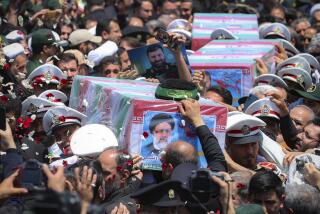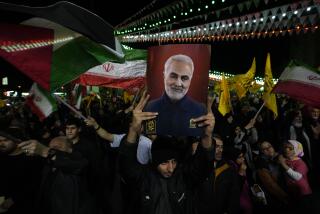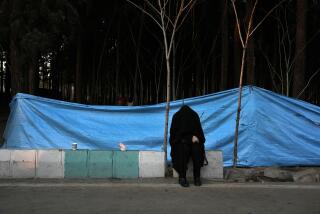Suicide Attacks, Bombings Leave Nearly 130 Dead in Iraq
BAGHDAD — Two massive suicide bombings outside a shrine and a police recruiting center and a roadside blast near the capital killed at least 120 Iraqis and seven Americans on Thursday, one of the deadliest days since the U.S.-led invasion in 2003.
Both suicide attacks occurred shortly after 9 a.m. In Karbala, 60 miles south of Baghdad, at least 50 people were killed when a bomber set off explosives near the glistening shrine of Imam Hussein, police chief Razzaq Taii said. Iraqi television broadcast footage of the carnage throughout the day, showing pools of blood, shredded clothing and frenzied rescue efforts outside the shrine, one of Shiite Islam’s most sacred sites.
In Ramadi, a volatile city in western Iraq dominated by Sunni Muslims, a bomber detonated a suicide vest outside a police recruiting center. A hospital official said at least 70 died in the blast. A U.S. Marine and a soldier also were killed, said Army Col. John L. Gronski, who had stepped inside the gates just before the explosion.
And in the Baghdad area, a roadside bomb killed five U.S. soldiers on patrol, the military said in a statement.
After a period of relative calm surrounding the Dec. 15 parliamentary elections, insurgent attacks have risen dramatically this week. On Wednesday, nearly 50 people died in violence around the country, including a bombing at a funeral in a town north of Baghdad.
Thursday’s attacks appeared to be aimed at undercutting U.S. and Iraqi efforts to stabilize the country.
The assault at the Imam Hussein shrine seemed intended to heighten tensions between Iraq’s majority Shiites and minority Sunni Arabs, who form the backbone of the insurgency. The attack touched off calls for revenge against Sunnis.
The blast in Ramadi, meanwhile, targeted Sunni Arabs queuing up to join the police force and appeared to be aimed at halting efforts to recruit young men to draw them away from the insurgency and balance the makeup of Iraq’s security forces, which have disproportionately high numbers of Shiites and Kurds. Scandals involving the torture of prisoners have prompted investigations of Iraqi police units dominated by Shiite militias.
U.S. military commanders have long tried to build a local police force in Al Anbar province, where Ramadi is located, with limited success. In the last three days, though, hundreds of Sunni Arab men had come to the recruiting center at the urging of tribal leaders.
On Thursday morning, Marines with bomb-sniffing dogs were screening job-seekers when the attacker got in line and detonated his explosives.
Body parts were strewn in the mud and American soldiers and their Iraqi counterparts raced to give first aid to the wounded. At least 30 people were injured.
People sorted body parts from the debris. A row of bodies lay on stretchers beside the road. “Hurry, help them, please,” Maj. Victor Sarkozi pleaded to an Iraqi soldier.
Sarkozi’s uniform was stained with the blood of the wounded he had helped evacuate to the hospital on base.
The Ramadi attack was unusual; insurgents in Al Anbar have largely focused on U.S. forces. And assaults on Iraqi civilians have tended to target gatherings of Shiites, such as Thursday’s blast in Karbala.
Despite more than two years of violence, Iraq’s Shiite clerics have urged their followers to refrain from reprisals as the sect consolidates its power through the electoral process. The blast may have been intended to provoke a reaction from the clerics, but there was no public response from them.
An official of the leading Shiite political party, though, said that Sunni political groups that have shown partiality to insurgents would pay a political price for the violence as negotiations on a coalition government continue.
“Blackmailing with the souls of the Iraqis for short-term political benefits will make us more certain that we should not let the justifiers and promoters of terrorism participate in the forthcoming government,” Abdelaziz Hakim, leader of the Supreme Council for Islamic Revolution in Iraq, said in a statement.
Other Shiites reeled with anger. One TV news program aired unedited rants from callers demanding revenge against Sunnis.
U.S. officials have been encouraging Shiite and Kurdish leaders to ensure Sunni participation in the new government as a way of blunting the insurgency. It is unclear what links might exist between Sunni politicians and various insurgent groups.
The Iraqi Accordance Front, the main Sunni coalition, denounced the violence but blamed Iraq’s leaders for allowing it to happen.
“This government has not only failed to end violence, but it has become an accomplice in the cycle of violence by adopting sectarian policies and by weakening the state and strengthening militia groups,” Izzat Shahbandar, a senior official with the Sunni coalition, told Associated Press.
There was no immediate claim of responsibility for either of the suicide blasts, though U.S. officials blamed Al Qaeda in Iraq, led by Abu Musab Zarqawi, a Jordanian-born militant.
The Imam Hussein shrine in Karbala commemorates a grandson of the prophet Muhammad. Hussein was killed in the 7th century in a conflict at the beginning of the split between Shiites and Sunnis. On the other end of a long plaza is a shrine for Hussein’s half-brother, Imam Abbas.
Hundreds of thousands of Shiites make an annual pilgrimage to the shrine complex to mark Hussein’s martyrdom. The gathering was targeted in a 2004 bomb attack that killed more than 100 pilgrims. Security at the site is in the hands of a Shiite militia called the Badr Brigade.
Karbala had been relatively quiet for a year, but two people were wounded Wednesday in a car bombing. The last large-scale attack there had occurred in December 2004, when a car bomb killed 14 people and wounded 57.
Thursday morning, the square was crowded with pilgrims and vendors when the bomb detonated. Television crews arrived quickly to capture the panic and confusion as uniformed Iraqi forces moved in and survivors hauled the injured away on small carts used to carry the elderly and disabled to the shrine. Emergency crews loaded plastic-covered bodies into pickup trucks.
One witness said more people would have been killed if a water truck had not been in the square, shielding some of the pilgrims.
After the explosion, police officers patrolled the city in cars, asking people through loudspeakers to donate blood, Hadi Minkhul Ubaid said. He went to the donation center and found it full.
“The atmosphere of the city is tension and sadness,” said Ali Shaibani, 48, a teacher and actor who witnessed the blast.
Smith reported from Baghdad and Roug from Ramadi. Times staff writers Shamil Aziz, Suhail Affan and Raheem Salman in Baghdad and special correspondent Saad Fakhrildeen in Najaf contributed to this report.
More to Read
Sign up for Essential California
The most important California stories and recommendations in your inbox every morning.
You may occasionally receive promotional content from the Los Angeles Times.











